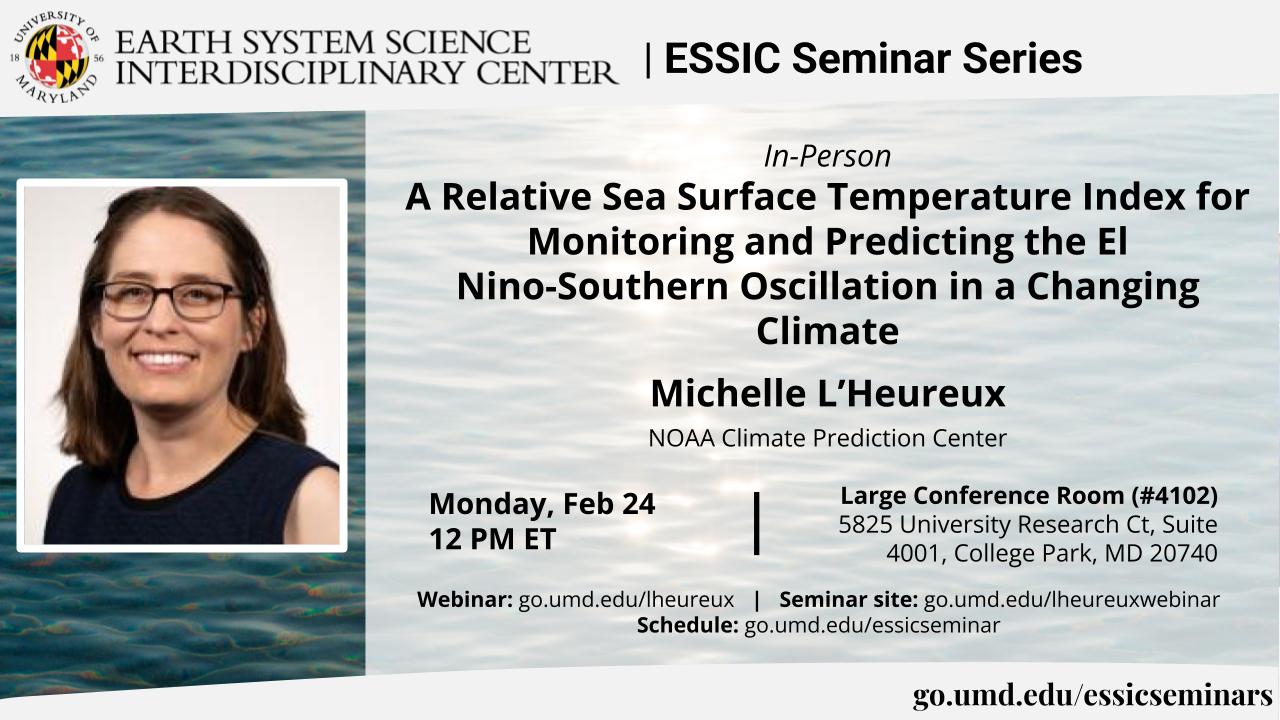
A Relative Sea Surface Temperature Index for Monitoring and Predicting the El Nino-Southern Oscillation in a Changing Climate
Michelle L’Heureux
NOAA Climate Prediction Center
Monday February 24, 2025, 12 PM ET
In-Person Seminar Info:
This seminar will be held at noon at Rm 4102 of ESSIC, 5825 University Research Ct. College Park, MD 20740. In-person attendance is welcome with refreshment provided. Zoom is also provided for virtual participants.
Please RSVP for in-person attendance!
Abstract:
Trends in sea surface temperature anomalies across the tropical Pacific have presented complications for the monitoring and prediction of the El Niño-Southern Oscillation (ENSO). Specifically, ENSO is primarily measured using sea surface temperature (SST) anomalies and indices, which require the choice of a climatology. The climatology has changed over time, which necessitates new methods to ensure that SST anomalies are accurately reflecting the coupled ENSO state. A relative SST index is introduced and explored for suitability in ENSO operations. Here, we introduce this index and explain why the relative ENSO index may be more physically suitable in a changing climate than previous traditional methods for monitoring and predicting ENSO. We also provide evidence that progressively larger departures between the traditional and relative SST indices may result in offsets between tropical SST and atmospheric anomalies that constitute the ENSO state. Finally, it appears that forecasting errors using the traditional SST index are increasingly larger than those using the relative SST index.
Biosketch:
Michelle L’Heureux is a physical scientist at NOAA’s Climate Prediction Center near Washington DC, where she has worked for 20 years. For the last 17 years, she has led the El Niño-Southern Oscillation (ENSO) team, which is responsible for regularly issuing NOAA updates on El Niño and La Niña. Michelle is also a lead coordinator, writer, and editor for the ENSO Blog, which is hosted by NOAA climate.gov. She enjoys using the blog to engage the science-interested public on ENSO and other climate topics. Also, she is currently the co-chair of the US CLIVAR Predictability, Predictions, and Applications Interface (PPAI) panel and serves on the US CLIVAR Scientific Steering Committee. She has previously served as a U.S. expert on the Task Team on World Meteorological Organization (WMO) accredited ENSO information. Michelle participates in applied research to improve knowledge and prediction of subseasonal-to-seasonal climate variability, and is an author or co-author on over 50 journal articles.
Event Information:
This is an in-person seminar with refreshments served at Rm 4102, 5825 University Ct, MD.
Event site: https://go.umd.edu/lheureux
Zoom Webinar: https://go.umd.edu/lheureuxwebinar
Zoom Meeting ID: 992 9576 9700
Zoom password: essic
US Toll: +13017158592
Global call-in numbers: https://umd.zoom.us/u/aMElEpvNu
For IT assistance:
Cazzy Medley: cazzy@umd.edu
Resources:
Seminar schedule & archive: https://go.umd.edu/essicseminar
Seminar Google calendar: https://go.umd.edu/essicseminarcalendar
Seminar recordings on Youtube: https://www.youtube.com/user/ESSICUMD

